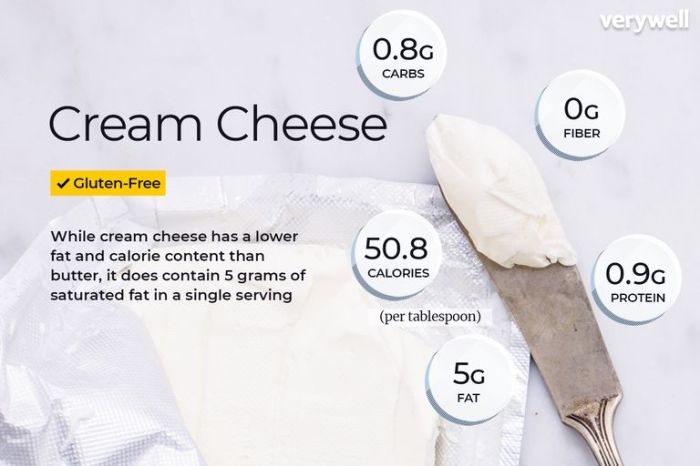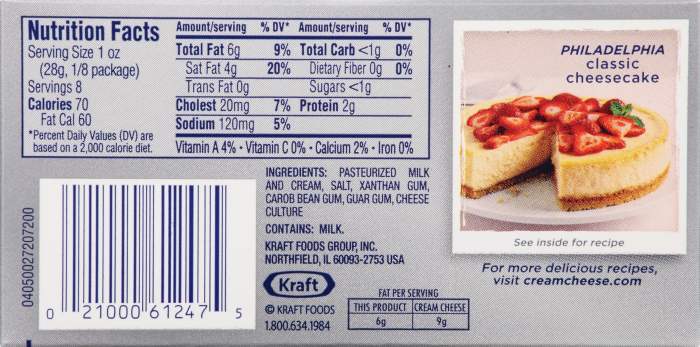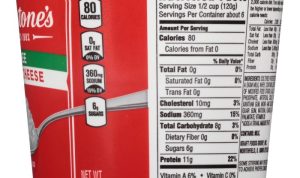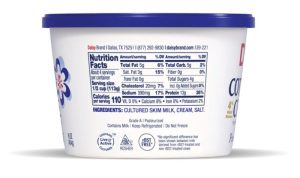Health Implications of Cream Cheese Consumption

Nutrition of cream cheese – Cream cheese, a popular dairy product, presents a complex nutritional profile with both potential benefits and drawbacks for health. Regular consumption necessitates a balanced approach, considering its high fat and calorie content alongside its contribution of certain vitamins and minerals. Understanding the impact of cream cheese on various health aspects is crucial for informed dietary choices.Cream cheese is undeniably rich in saturated fat, a known contributor to elevated cholesterol levels.
This impact on cholesterol and blood pressure is a significant concern. The high fat content can lead to increased LDL (“bad”) cholesterol, potentially increasing the risk of cardiovascular disease. While cream cheese provides some calcium, its saturated fat content outweighs this benefit in terms of heart health. Furthermore, high sodium content in some varieties can contribute to elevated blood pressure.
Therefore, individuals with pre-existing cardiovascular conditions or those at risk should exercise caution and moderation in their cream cheese consumption.
Impact on Cholesterol and Blood Pressure
Regular consumption of high-fat dairy products like cream cheese can negatively influence lipid profiles. Studies have shown a correlation between saturated fat intake and elevated LDL cholesterol levels. This increase in LDL cholesterol, coupled with a potential decrease in HDL (“good”) cholesterol, significantly elevates the risk of atherosclerosis and other cardiovascular complications. Similarly, the sodium content in many cream cheese varieties can contribute to water retention and increased blood pressure, especially in individuals sensitive to sodium.
Careful consideration of portion sizes and choosing lower-sodium options are crucial to mitigate these risks. For example, a person consuming a large amount of cream cheese daily might experience a noticeable increase in LDL cholesterol within a few weeks, potentially requiring dietary adjustments or medical intervention.
Relationship Between Cream Cheese Consumption and Weight Management, Nutrition of cream cheese
Cream cheese’s high caloric density poses a challenge for weight management. A single serving contains a significant number of calories, primarily from fat. Regular consumption of substantial quantities of cream cheese, particularly without compensating adjustments in other dietary components, can easily lead to weight gain. For instance, adding cream cheese to bagels or using it liberally in dips adds considerable calories to the meal, potentially exceeding daily recommended limits.
Cream cheese, while delicious, packs a punch in terms of saturated fat and sodium. Understanding its nutritional profile is key to mindful eating. This is especially relevant when considering a complete breakfast like a bacon, egg, and cheese bagel, where the cream cheese contributes significantly to the overall nutritional content. Check out a detailed breakdown of a bacon egg cheese bagel nutrition to see how cream cheese fits into the bigger picture.
Ultimately, moderation and balance are crucial when enjoying the creamy goodness of cream cheese.
This is further exacerbated by the fact that cream cheese often accompanies foods already high in carbohydrates and fats, leading to a caloric surplus. Therefore, mindful consumption and portion control are essential for individuals aiming to maintain or lose weight. Replacing cream cheese with lower-calorie alternatives or reducing portion sizes can contribute significantly to weight management goals.
Cream Cheese and Dietary Considerations

Cream cheese, a beloved dairy product, presents a unique set of nutritional challenges and opportunities depending on individual dietary needs and preferences. Understanding its composition and making informed choices is crucial for maintaining a healthy diet. This section will explore the suitability of cream cheese for various dietary restrictions and offer guidance on healthier alternatives.Cream cheese is notably high in saturated fat and sodium, factors that can negatively impact cardiovascular health.
Individuals with high blood pressure or high cholesterol must exercise caution and moderation in their consumption. Furthermore, its lactose content poses a significant hurdle for those with lactose intolerance. However, with careful selection and mindful consumption, cream cheese can be incorporated into a balanced diet even with these considerations.
Cream Cheese and Lactose Intolerance
Lactose intolerance, a common condition characterized by the inability to digest lactose, the sugar in milk, renders traditional cream cheese problematic for many. The symptoms, ranging from bloating and gas to diarrhea, can be significantly disruptive. Fortunately, lactose-free cream cheese alternatives are readily available, allowing individuals with lactose intolerance to enjoy the creamy texture and flavor without the digestive distress.
These alternatives often utilize lactase enzyme treatment to break down the lactose, or are made with alternative milk sources like soy or almond milk. Choosing these options ensures a pleasurable culinary experience without compromising health.
Cream Cheese and Cardiovascular Health
The high saturated fat and sodium content in many cream cheeses presents a challenge for individuals concerned about cardiovascular health. Saturated fat contributes to elevated cholesterol levels, increasing the risk of heart disease. Similarly, high sodium intake can exacerbate high blood pressure. To mitigate these risks, opting for lower-fat cream cheese options, or consuming cream cheese sparingly, is recommended.
Reading nutrition labels carefully and comparing fat and sodium content across different brands is crucial for making informed choices. Portion control is also paramount. For instance, instead of using a generous amount of cream cheese as a spread, consider using a smaller amount and pairing it with high-fiber foods like whole-grain crackers or vegetables.
Choosing Healthier Cream Cheese Alternatives
For individuals with specific dietary restrictions, choosing appropriate alternatives is vital. Here’s a guide:
- For Lactose Intolerance: Look for lactose-free cream cheese options explicitly labeled as such. These are often made using lactase-treated milk or plant-based milks.
- For High Cholesterol: Opt for low-fat or reduced-fat cream cheese varieties. These options still provide the creamy texture but with significantly less saturated fat.
- For High Blood Pressure: Select low-sodium or reduced-sodium cream cheese. Always check the nutrition label to compare sodium content across different brands.
- For Vegan Diets: Numerous plant-based cream cheese alternatives exist, made from ingredients like cashews, almonds, or tofu. These often mimic the taste and texture of traditional cream cheese while being free from dairy products.
Remember, even with healthier alternatives, moderation is key. Cream cheese, regardless of its formulation, remains a calorie-dense food. Incorporating it into a balanced diet, alongside plenty of fruits, vegetables, and whole grains, is essential for overall well-being.
Clarifying Questions: Nutrition Of Cream Cheese
Is cream cheese a good source of protein?
Yes, cream cheese provides a moderate amount of protein, although it’s not as high in protein as some other dairy products like yogurt or cottage cheese.
Can I eat cream cheese if I’m lactose intolerant?
Lactose-free cream cheese options are available for individuals with lactose intolerance. However, even these may contain trace amounts of lactose, so individual tolerance varies. Always check the product label.
Does cream cheese contain saturated fat?
Yes, cream cheese is relatively high in saturated fat, particularly full-fat varieties. Choosing low-fat or whipped options can help reduce saturated fat intake.
How can I use cream cheese in baking without adding too much fat?
Substitute a portion of the cream cheese with applesauce or Greek yogurt in recipes to reduce fat content while maintaining moisture.




